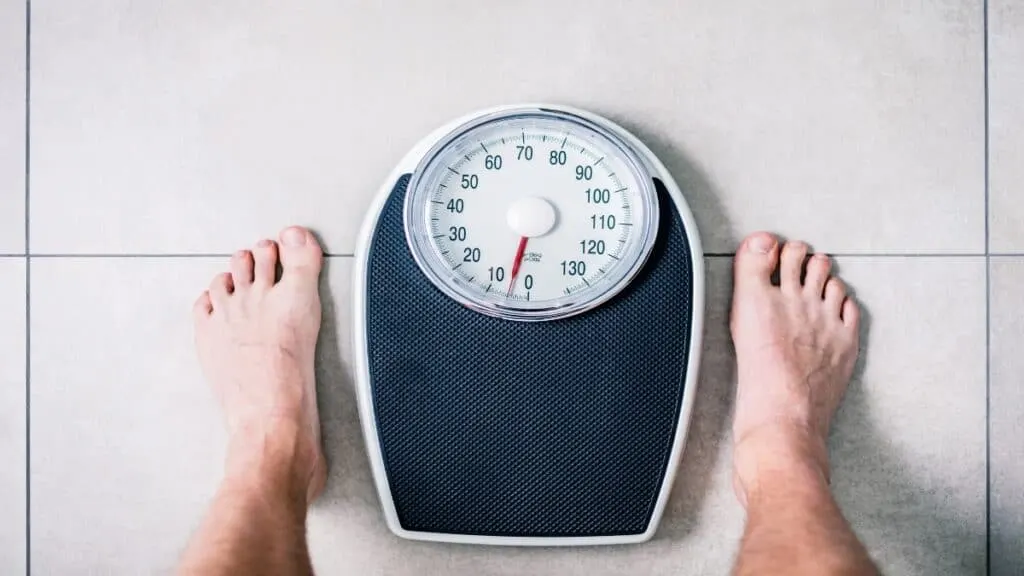In today’s article, you’ll learn the average weight for a 5’11 male and the average weight for a 5’11 female so that you can see how your body weight compares.
We’ll also discuss what a healthy weight for a 5’11 male really is. Can you have a high BMI while still being healthy?
Let’s find out.
Related Weight Articles:
- How much should a 5’7 male weigh?
- How much should a 5’8 male weigh?
- How much should a 5’9 male weigh?
- How much should a 5’10 male weigh?
What is the average weight for a 5’11 male?

What is the average weight for a 5’11 male? According to body weight measurement data, the average weight for a 5’11 male is around 207 pounds or 94 kilograms.
This estimate is based on the body weights of over 5,000 American men, so it’s likely to be pretty accurate and up to date.
As any BMI calculator will tell you, a 5’11 man who weighs over 200 lbs is well into the overweight category.
So although you might have a normal weight for a 5’11 male, fitting in with the norm doesn’t mean that you’re healthy.
The amount of muscle on your body and your bone will both determine your amount of lean mass, which can make a given body weight healthier or unhealthier. In other words, it’s better to have more muscle and bone mass than it is to have fat tissue.
Related: Average male weight by age
What’s the average weight for a 5’11 female?

The average weight for a 5’11 female is likely to be in excess of 185 lbs, which works out to around 84 kg.
Obviously, since some tall women tend to be quite slim, it’s totally possible that many 5’11 women will weigh much less than this 185-pound estimate.
You see, the average woman is only 5’4, which is a massive 7 inches shorter than our 5’11 female example.
So when you factor in the average weight for all women (170 lbs), it’s only logical that a woman who’s much taller than average is also going to weigh quite a bit more than average.
After all, a woman who’s 5’11 is 1-2 inches taller than the average man!
Related: Average American woman weight
How much should a 5’11 male weigh to be healthy?

You can’t base health on your body weight. Sure, if your weight is extremely low or ridiculously high, then you’re very likely to be unhealthy.
But in between the extremes, a particular body weight doesn’t guarantee good health or poor health.
Still, we can use BMI to give a healthy weight range. But just know that if you have a fairly lean body, you can exceed the upper BMI weight while still being healthy.
You should also know that 1) BMI is the same for men and women, and 2) the lower end of the range is very skinny for most men.
So, in terms of BMI, a healthy weight for a 5’11 male (or a 5’11 female) is between 134 lbs and 179 lbs.
Related:
Is there such a thing as the perfect weight for a 5’11 male?

While it’s a good idea to maintain a non-overweight BMI, your body weight and BMI don’t guarantee good health. As such, there’s no such thing as the perfect weight for a 5’11 male.
Your body composition, something that BMI can’t measure, is also important when it comes to physical health.
It’s much better to be a lean 180 pounds (and I don’t mean ripped, just fairly lean) than it is to be a chubby 170 lbs with very little muscle.
While extreme amounts of muscle mass can put stress on the body, it’s generally better to have more muscle mass on your frame than body fat.
What is a good BMI for a 5’11 male?

A good BMI for a 5’11 male and a 5’11 female is between 18.5 and 24.9, which works out to a body weight ranging from 134 pounds up to 179 pounds.
While being within this body weight range is likely ideal, a particular BMI doesn’t guarantee a particular health status unless it’s on the extreme ends of the BMI scale, in which case you’d definitely be unhealthy.
With that said, let’s take a look at some body weights that a 5’11 person could plausibly have and see whether they’re healthy or unhealthy for most people.
5’11 110 lbs
A person has an extremely low 15.3 BMI if they’re 5’11 and 110 lbs. This BMI is so low that most people simply wouldn’t reach it.
5’11 120 lbs
Those who are 5’11 and weigh 120 lbs have a pretty low 16.7 BMI, which is around 2 BMI points into the underweight classification. Similarly, people who are 5’11 and 125 lbs have a BMI of 17.4.
5’11 130 lbs
If you’re 5’11 and 130 lbs, then your BMI is 18.1 (underweight), whereas if you’re 5’11 and 135 lbs, then your BMI is 18.8 (normal).
5’11 140 lbs
Men and women who are 5’11 and 140 lbs have a 19.5 BMI. In a similar way, those who are 5’11 and 145 lbs have a 20.2 BMI.
5’11 150 lbs
You have a 20.8 BMI if you’re 5’11 and 150 lbs, and you have a 21.6 BMI if you’re 5’11 and 155 lbs.
5’11 160 lbs
Are you 5’11 and 160 lbs? If so, then you have a BMI of 22.3. Similarly, if you’re 5’11 and weigh 165 pounds, then your body mass index result is exactly 23.
5’11 170 lbs
If you’re 5’11 and 170 lbs, then you have a 23.7 BMI, which is on the higher end of the normal range. Similarly, if you’re 5’11 and 175 lbs, then your BMI is 24.4.
5’11 180 lbs
People who are 5’11 and 180 pounds have a 25.1 BMI, meaning that those who are 5’11 and weigh 180 lbs are classed as overweight (only just) even though they’re much lighter than average.
Obviously, if you’re a lean 180 lbs, then you’re likely to be pretty healthy.
In a similar way, if you’re 5’11 and 185 lbs, you’d have a 25.8 BMI, which also has the potential to be healthy if you’re fairly lean.
5’11 190 lbs
If you’re 5’11 and 190 lbs, then you have a BMI of 26.5. Additionally, if you’re 5’11 and weigh 195 lbs, then you have a BMI of 27.2.
5’11 200 lbs
Those who are 5’11 and 200 lbs have a BMI of 27.9, which is in the middle of the overweight range. Similarly, people who are 5’11 and weigh 205 lbs have an overweight BMI of 28.6.
5’11 210 lbs
Men and women who are 5’11 and 210 lbs have a 29.3 BMI, which is on the high end of the overweight classification. Those who are 5’11 and 215 lbs have a similarly high BMI of 30.
5’11 220 lbs
You have a 30.7 BMI if you’re 5’11 and 220 lbs. In a similar manner, you have a 31.4 BMI if you’re 5’11 and 225 lbs. Both of these scores are considered obese.
5’11 230 lbs
Anyone who is 5’11 and 230 lbs has a BMI of 32.1, while people who are 5’11 and 235 lbs have a 32.8 BMI.
5’11 240 lbs
People who are 5’11 and weigh 240 pounds have a body mass index score of 33.5, while those who are 5’11 and 245 pounds have a BMI of 34.2.
5’11 250 lbs
Those who are 5’11 and 250 lbs have an obese 34.9 BMI. Similarly, people who are 5’11 and 255 lbs have a very high BMI of 35.6.
5’11 260 lbs
A person who is 5’11 and 260 pounds has a BMI result of 36.3, which is class 2 obesity. Additionally, men and women who are 5’11 and 265 lbs have an obese body mass index of 37.
5’11 270 lbs
Are you 5’11 and 270 lbs? If this is the case, then your BMI is a hefty 37.7. Also, those who are 5’11 and 275 lbs have a body mass index score of 38.4.
5’11 280 lbs
Anyone who is 5’11 and 280 lbs has a BMI of 39.1, and people who are 5’11 and 285 lbs have a BMI of 39.7.
5’11 290 lbs
If you’re 5’11 and 290 lbs, then your body mass index is 40.4, which is severely obese. Similarly, you have a very high BMI of 41.1 if you’re 5’11 and weigh 295 lbs.
5’11 300 lbs
People who are 5’11 and 300 lbs have a 41.8 BMI, and those who are 5’11 and 310 lbs have a 43.2.
Conclusion: The ideal weight for a 5’11 male and a 5’11 female

Based on BMI, the ideal weight for a 5’11 male and a 5’11 female is, roughly speaking, between 135 lbs and 180 lbs. That’s a big range, and most fully-grown 5’11 men will weigh closer to 180 lbs than to 135 lbs.
Of course, you can exceed this upper weight and still be healthy. But this doesn’t mean that BMI is useless. A lot of healthy 5’11 people have a BMI within the normal range, and that’s our default recommendation for people who don’t have loads of muscle mass.
Naturally, 5’11 women will have lower body weights than 5’11 men (in most cases) due to having less muscle mass.
References
- Jéquier, E., & Tappy, L. (1999). Regulation of body weight in humans. Physiological reviews, 79(2), 451–480. https://doi.org/10.1152/physrev.1999.79.2.451
- McMahan, I. (2023, January 29). For longevity, muscle strength may be as important as aerobic exercise. Washington Post. https://www.washingtonpost.com/wellness/2023/01/29/strength-training-all-ages/
- Roubenoff, R., & Kehayias, J. J. (1991). The meaning and measurement of lean body mass. Nutrition reviews, 49(6), 163–175. https://doi.org/10.1111/j.1753-4887.1991.tb03013.x

